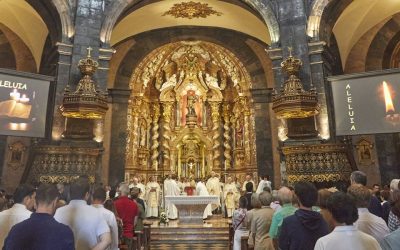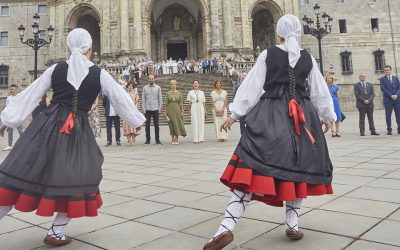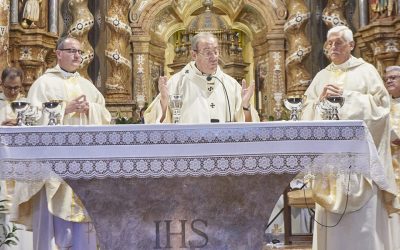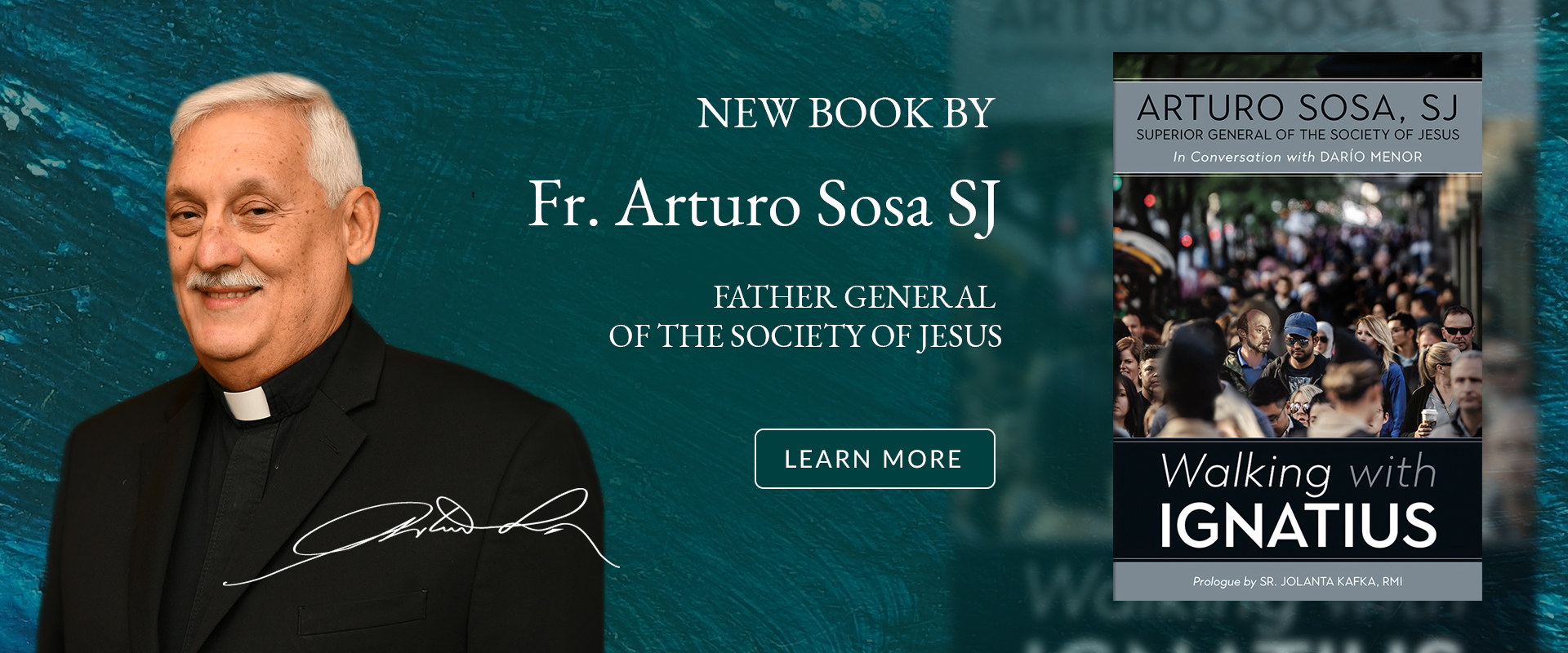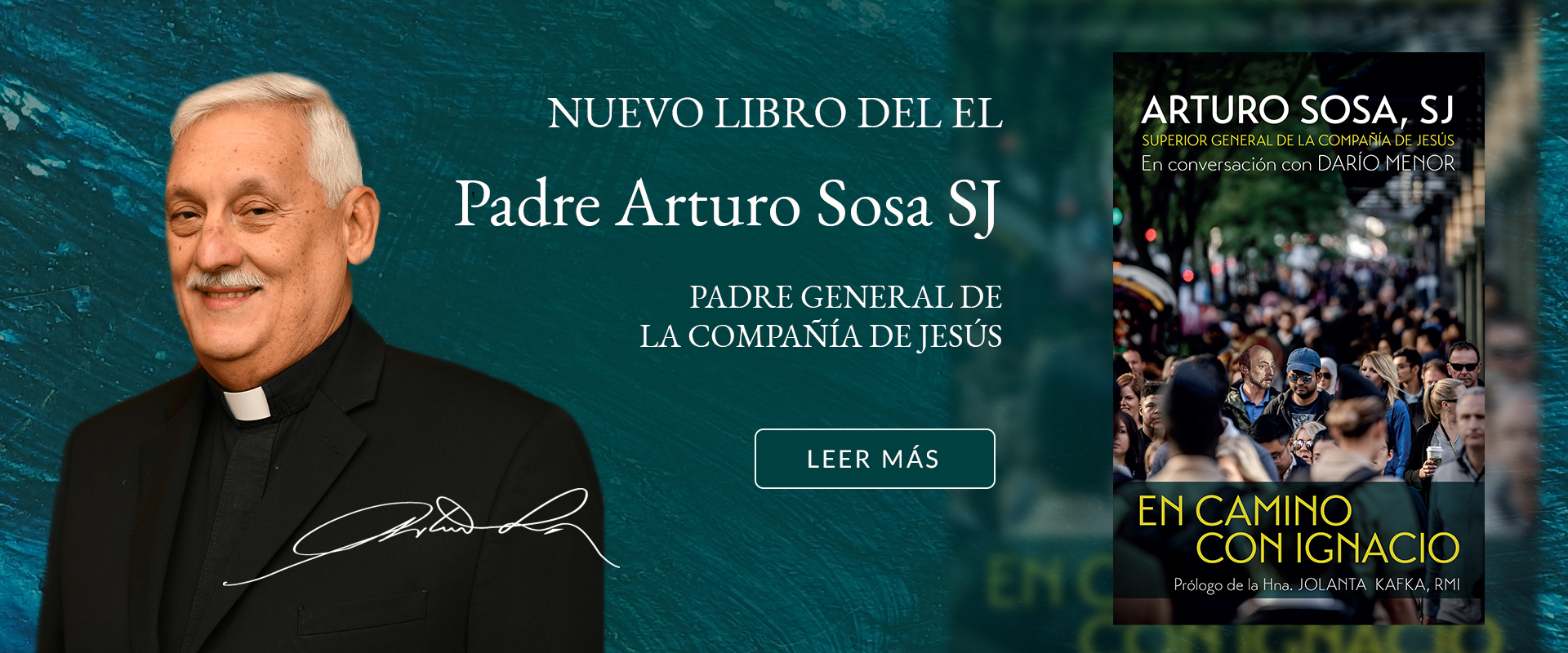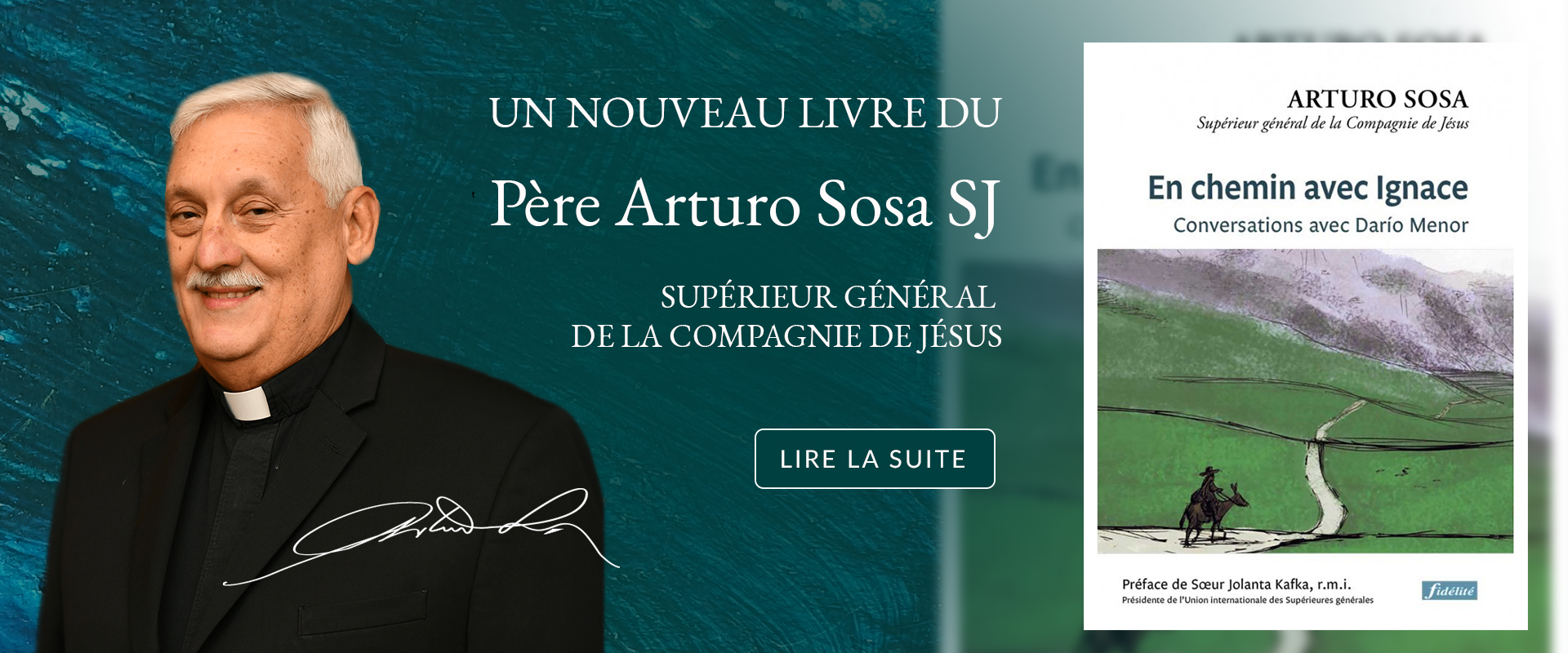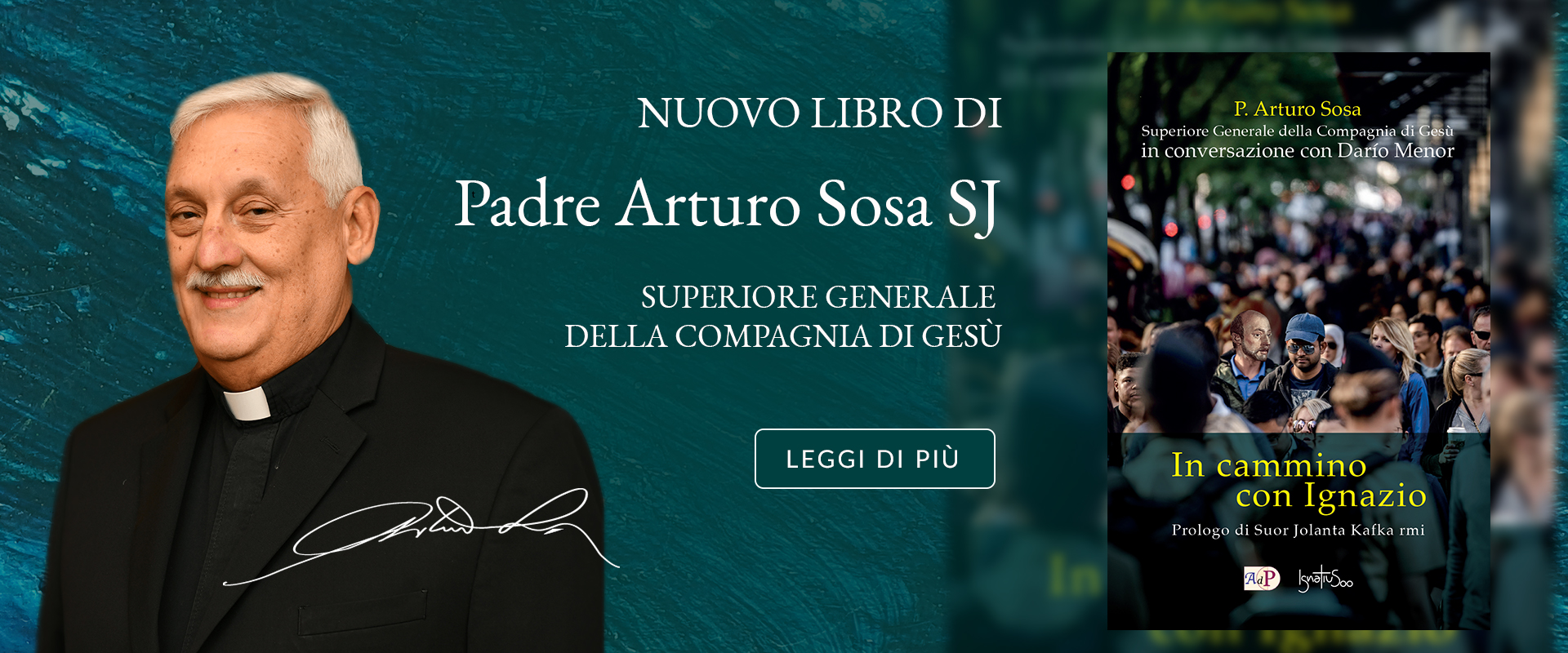During this Ignatian Year, we are publishing a series of homilies that Fr. General Kolvenbach held on the feast days of St. Ignatius. In this homily, Fr. Kolvenbach focuses on the importance of the Eucharist for St. Ignatius.
Church of the Gesù, Rome, July 31st 1985
Let us turn our eyes towards Saint Ignatius’ burial-place, here in the church of the Gesù where we are celebrating together the Saint’s feast this evening. There is nothing strange about his being represented dressed in a chasuble, because the celebration of the Eucharist was truly at the heart of his apostolic mysticism.
On the eve, before celebrating the Eucharist, Ignatius meditated the liturgical texts and, after the Mass, he liked to spend two hours in thanksgiving. The importance of matters on hand or the urgency of apostolic work was of little importance: no one had the right to disturb him during this privileged time. To remain united to the eucharistic sacrifice during the day, Ignatius had a window made in the wall so that he could always see the altar and remember the paschal mystery. The witnesses are unanimous: during Mass, which lasted a little over one hour, Ignatius received great consolation and an extraordinary sense of the Trinity at work in human history, in the life of the Church, in the profoundest intimacy of his personal mission. Thus the Eucharist prevailed on him in all its paschal reality, which was so joyous and painful that he often was exhausted by it. During the last years of his life he celebrated only on Sundays and feast days because of his poor health, which no longer could bear – the sources say – the exhausting visions which accompanied his Mass. In the Eucharist Ignatius died with his Lord for the life of his brothers, to “help souls”.
Ignatius prepared himself for months before celebrating the Eucharist for the first time on Christmas night 1538 in front of the relic of the crib in Saint Mary Major. He who had so longed to remain in the Holy Land, to “help souls there” by announcing the mystery of the incarnation, celebrated his Mass in Rome, on the world, obeying his Divine Majesty’s will. Three years later, surrounded by his first companions, Ignatius pledged himself in front of the host to follow the poor, chaste and obedient Lord in the Society of Jesus. Still today the Jesuits, who existentially place their lives under the sign of the bread broken and the blood shed for the life of the world, repeat the gestures the first companions performed at Saint Paul’s outside the walls.
To give this young company Constitutions Ignatius sought inspiration in the many Masses he celebrated; the most important steps always obtained divine confirmation during the Eucharist celebrated for this intention. This love for the Eucharist could not fail to be transmitted to Ignatius’ companions who experienced the same eucharistic hunger, introducing daily Mass and frequent – in fact daily – communion. Faithful to this spiritual tradition the last General Congregation declared that “our life, following the example of Ignatius’ life, is rooted in the experience of God, who through Jesus Christ calls us, gathers us in unity and sends us on the mission. The Eucharist is the privileged place where we celebrate this reality”.
This love for the Eucharist could not be lacking in the Spiritual Exercises. In fact the contemplation of the Supper was called the third Foundation of the Exercises, after the first Principle and the Kingdom. The Eucharist is placed in conjunction between the second and third week, as the central point where all my concrete desire to be with Christ converges and from where flows the accomplishment of this desire on my paschal way with Christ through his Eucharist. Thus the Eucharist presents itself in the first place – as Paul already reminded us – as a true judgement. Each person manifests in it the spirit of which he is made, because our election, our choices are compared to the path the Lord has chosen. Those who do not discern what the body and blood of Christ means for them, eat and drink their own condemnation. In communion with Christ’s offering in the Supper, choosing Christ’s path assumes the full significance of a personal and ecclesial conversion. Just as every product of nature becomes human nourishment through a conversion; just as wheat does not become bread unless it has been reaped, threshed and ground; so when the Lord says during the Supper “this is my body” to be our nourishment of life, he consecrates himself to a death which alone accomplishes a conversion of this kind and renders it fruitful. This conversion is the paschal passion – this ardent desire to eat the Pasch with us all so that all may pass from their death to life. Thus the Lord comes out of himself and hands himself over to others; he who was God surrenders himself and becomes the nourishment of all people. And so it is not surprising that, for his conversion, Ignatius struggled in the Eucharist when he allowed what he had and what he was to be taken, to be converted not to his own projects and generous choices but to the sentiments which were Christ’s in his Passion. Through the Eucharist Ignatius’ life became the exodus of a naturally egotistical and limited person converted into nourishment “for you and for many”. It is in the Eucharist that the words, thoughts, desires and aspirations aroused by the Exercises become essentially the body and blood, the crude reality of our lives in the crucifying and resurgent reality of Christ.
And so taking communion means wanting the concrete story of our personal and community lives to be seized and transformed by the paschal story of the Lord Jesus, who continues his passion until the end of time. In this conjunction, accomplished by the Eucharist alone, Ignatius discovered the source of his spirituality and apostolate. At times, when reading his Diary, we notice that Ignatius was drawn to look up high into the sky. But the Eucharist reminded him of the word the apostles were listening to on the day of the ascension: Why are you looking into the sky? It is down here, in daily life, in every day existence with its joys and sorrows symbolized by the bread and wine, that the Trinity wishes to be discovered, adored and served, at work for us. The following are words of one of Ignatius’ close collaborators: “I don’t want you to be a spiritual and absorbed man only when you celebrate Mass, no; you must also be a spiritual and absorbed man in your work, so that all the force of the spirit and grace shine in your works”.
Thus Ignatius no longer sought union with the Trinity high up in the ever greater height of pure idealism or truly pure interiority but in the communion of the bread and wine which the Lord’s passion converts into works of the Trinity. On the eve of his passion, after the Lord Jesus took the bread in order to give himself lovingly in life-giving nourishment for all people, everything mystical was accomplished through the heavy, humiliating and humiliated body of man. Does a more sublime and humbler eucharistic prayer exist than that of the Principle in the Spiritual Exercises, which dares place on the paten our yearning not to want health more than sickness, wealth more than poverty, honour more than dishonour, a long life more than a short one and so forth without exception for everything in our existence, desiring and choosing only the path of the Lord’s Passion which the Eucharist never ceases to accomplish in us? Is there a eucharistic prayer which dares “highly and humbly” to translate the “this is my body” like the one at the end of the Exercises: to allow the Lord to take freedom and memory, intelligence and will, having and being, to receive the gift of love and grace which is yourself, the body of Christ, the blood of Christ for the life of the world? The Eucharist, “for this is all I need”.
An art critic noted that the priestly vestments – the chasuble Ignatius wore – are and must be the most beautiful vestments because they must hide so much human weakness and poverty. At a certain period of his life Ignatius was in the habit of writing after his signature this mysterious expression: “de bondad pobre”, poor in goodness, poor in love. Ignatius too had only five loaves and two fish and yet he shared the Lord’s mission to nourish the crowd. He too dreamed of making others participate fully in the Passion by which he allowed himself to be entirely conquered. And so it was from the Eucharist that Ignatius drew his faith in the slow eucharistic conversion of the world, a faith which accepted walking patiently and at length with every human being, so that he too might discover this conversion of his entire freedom into eucharistic love. Ignatius drew a hope from the Eucharist which waited, in spite of appearances, for the advent of him who celebrates the Eucharist, until he should come; above all the love which had already and not yet seized Ignatius and had been transformed through the Eucharist into an ardent desire to serve “wherever in the world the Vicar of Christ will send us”.
Read the other homilies here.


